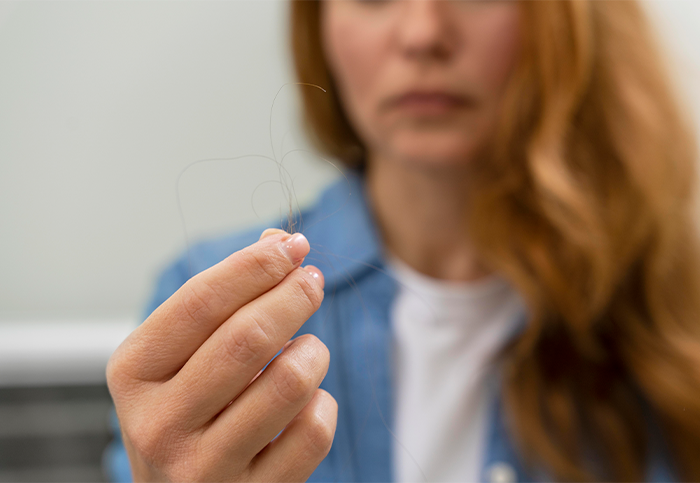Why Are Women at High Risk of Iron Deficiency?
Ask someone, "How are you doing?" The most common response you are likely to get, particularly from women, is "just tired." Sadly, many people count on being tired as a normal part of life. But what if it didn't have to be? There can be other meanings of being bored, tired, and not feeling well frequently that you are not getting.

What if one of the main reasons you feel exhausted all the time is that your body is missing an essential nutrient, iron? This is a very real possibility, as according to the NNS-2018 of Pakistan, iron deficiency is one of the main nutritional public health problems in Pakistan, which affects about 18.2% of women of childbearing age.
What Is Iron, and Why Do We Need It?
Iron is a mineral that plays many vital roles within the body, making it extremely important to your health. In particular, it helps produce red blood cells and works to transport oxygen throughout the human body. Iron is naturally found in a number of different foods, and this might make you think that you are easily getting enough iron from your regular diet. However, many people don’t know that the food items you take while taking iron-rich foods (food combination in a meal) are important, too.

Because the wrong combination of foods will prevent your body from effectively absorbing iron. For example, if you take iron-fortified bread with tea, the phytate present in tea will prevent iron absorption in the body. However, if you take vitamin-C-rich foods while taking iron-rich foods, vitamin C will facilitate iron absorption in the body.
Moreover, it is also important to know which type of iron you are taking: heme (animal sources) or non-heme (from plant sources). Heme iron can be easily absorbed in the body compared to non-heme iron. Therefore, to facilitate iron absorption in the body, prefer taking vitamin C along with it.
Food Sources of Iron and Its Facilitating Nutrient, Vitamin C

Please have a look at the table for a quick understanding.
|
Heme-Iron |
Non-Heme Iron |
Vitamin C Rich Foods |
|
|
|
What Happens If You Don’t Have Enough Iron?
Iron deficiency anemia is one of the most common deficiencies. This condition occurs when our body doesn't have enough red blood cells, which cells carry oxygen to our body's tissues. And the most common symptoms that appear are tiredness and shortness of breath.
Below are the mentioned deficiency symptoms that can help you recognize that you are deficient in iron or suffering from iron deficiency anemia. (For a proper diagnosis, it is recommended to consult your healthcare professional.)
Iron Deficiency Symptoms
|
Brittle nails |
|
Chest pain |
|
Cold hands and Feet |
|
Dizziness or being lightheaded |
|
Fast heartbeat |
|
Fatigue |
|
Hair loss |
|
Headache |
|
Inflammation or soreness of the tongue |
|
Pale skin |
|
Poor appetite |
|
Restless legs |
|
Shortness of breath |
|
Unusual cravings for non-nutritive substances (like dirt, ice, or starch) |
|
Weakness |
Why Are Women Most Likely to Be Deficient in Iron?
1. Heavy Periods
Women with heavy periods are at high risk of iron deficiency anemia. This is because they lose more than normal blood every month, i.e., >30-45 ml for seven days or more, which puts them at risk of iron deficiency.
2. Pregnancy
When a woman is pregnant, her body needs more iron to create extra red blood cells for the developing baby, which is crucial for the baby's healthy organ development, especially the brain. Without enough iron, the woman may have a condition called anemia. Additionally, in the last trimester of pregnancy, the baby begins to store iron, which it will use for the first six months after birth.
The mother is responsible for all kinds of iron supply to the growing baby. If she herself is deficient in iron, so does the baby. The lack of iron during pregnancy can cause: fatigue, weak immunity, cardiovascular stress (breathing problems), decreased work capacity, and iron deficiency anemia in women.
This deficiency also leads to an increased risk of premature delivery, low birth weight, and infant mortality. The recommended daily dose for pregnant women is 27mg per day.
3. Diet Low in Iron
Women who don't take enough iron in their diet, especially vegetarians, are at higher risk of iron deficiency anemia. Because iron from plant sources is harder to absorb than from animal sources. The iron we take from food should be stored in our bloodstream through the small intestine, but it requires a facilitating nutrient, vitamin C, for the body to absorb it properly.
Supplemental Iron

Iron deficiency can cause a variety of unpleasant symptoms. However, if it is left untreated, its deficiency worsens and leads to a variety of health problems, including pregnancy complications, heart problems, and increased susceptibility to infections. If you are concerned about not getting enough iron in your diet, supplementing with Nutrifactor's Fero Capsules and Fero Syrup can help fulfill your iron requirements.
References:
- https://www.healthline.com/health/iron-deficiency-anemia
- https://www.healthline.com/health/healthy-eating/7-nutrients-young-women-need-more-of
- https://pubmed.ncbi.nlm.nih.gov/21934611/
- https://www.healthline.com/health/how-much-blood-do-you-lose-on-your-period



